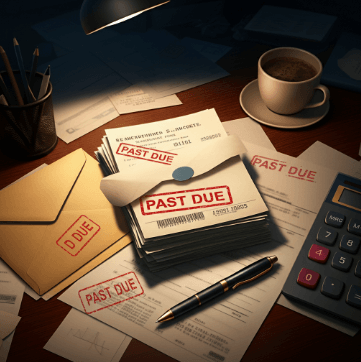Navigating the realm of real estate can feel pretty overwhelming, especially when encountering the term “Pre-Foreclosure in Florida.” This critical phase serves as a signal to property owners and potential buyers alike, highlighting the urgency and opportunities accompanying it. Understanding pre-foreclosure in Florida is essential for individuals intent on making informed decisions, whether to protect their assets or seize investment prospects. This blog will demystify the intricacies of pre-foreclosure processes, legal ramifications, and strategic responses explicitly tailored for the Florida market.
Real estate investors Steve Daria and Joleigh have an exceptional understanding of Florida’s pre-foreclosure landscape. Their insights into strategic property acquisition during this critical phase have provided novice and seasoned investors invaluable guidance. By following their expert advice, individuals can successfully maneuver the complexities of Florida’s pre-foreclosure market and capitalize on unique investment opportunities.
What is Pre-Foreclosure in Florida?
Pre-foreclosure is a crucial phase in the foreclosure process that begins when a lender files a notice of default on a property due to missed mortgage payments.
This period serves as a formal warning to the homeowner that they risk losing their home if they do not rectify the situation.
The notice of default serves as a formal legal notification to the homeowner regarding their delinquent mortgage payments and the possibility of foreclosure if the outstanding debt remains unresolved.
In Florida, the pre-foreclosure process is governed by strict legal guidelines but provides several lifelines for homeowners who act diligently.

Homeowners have a window of opportunity to address their financial issues before the property is sold at a foreclosure auction. Options available during this period include:
- Reinstating the mortgage by paying the overdue amount.
- Seeking a loan modification to make payments more affordable.
- Even if selling the property through a short sale, the lender accepts less than the owed amount.
How Does Pre-Foreclosure Happen?
Pre-foreclosure occurs primarily due to financial hardships that prevent homeowners from keeping up with their mortgage payments.
Common triggers include sudden job loss, severe illness leading to overwhelming medical bills, or significant changes in the real estate market that affect property values and the homeowner’s financial stability.
When a homeowner misses three to six months of mortgage payments, the lender begins foreclosure by sending a Notice of Default.
This legal document notifies the homeowner of their delinquency and sets the stage for potential foreclosure if the overdue payments are not addressed.
The Notice of Default marks the official start of pre-foreclosure, alerting the homeowner that they must immediately resolve their financial issues and avoid losing their home.
Get An Offer Today, Sell In A Matter Of Days
The Preliminary Steps to Pre-Foreclosure in Florida
The pre-foreclosure process intensifies once the lender files a notice of default.
Florida law provides specific rights and procedures that homeowners must understand to buy time, seek legal advice, or initiate the sale of their home.
Understanding the Lis Pendens Filing
The formal filing that signals pre-foreclosure in Florida is a Lis Pendens, which means “suit pending.”
It serves as public notice that the property is subject to a lawsuit and marks the start of formal foreclosure proceedings.
Homeowners typically have a 20-day window to respond legally.
Your Rights and Opportunities During Pre-Foreclosure
Homeowners in Florida have specific rights during pre-foreclosure.
They are entitled to receive information from the lender about the default, the amount owed, and procedures to save the home.
Homeowners can also seek public or legal assistance to understand their rights and have the power to reinstate the mortgage by paying off or negotiating the defaulted balance.
Seeking Mediation or Loan Modification
Homeowners facing pre-foreclosure can turn to mediation or loan modification.
Florida mandates mediation as an option, allowing borrowers and lenders to discuss alternatives to prevent default.
A loan modification can alter mortgage terms, such as lowering interest rates or extending repayment terms, to make payments more manageable.
Short Sale as an Alternative to Foreclosure
If reinstatement, mediation, or loan modification is not viable, a short sale is another option.
This negotiated settlement with the lender allows the homeowner to sell the home for less than the mortgage amount, avoiding the foreclosure process and its severe credit impact.
How to Navigate and Overcome Pre-Foreclosure Successfully
With the proper guidance, you can find practical solutions and regain control of your financial future.
This section will delve into actionable strategies for managing and overcoming pre-foreclosure challenges.
Staying Connected with Your Lender
Open communication with the lender is crucial.
Discuss your financial situation, potential tax implications, and available support from government or charitable organizations.

Exploring Forbearance Agreements
A forbearance agreement can temporarily relieve stress by delaying or reducing mortgage payments.
It can be a lifeline, allowing homeowners to stabilize their finances.
Selling to Stop Foreclosure
Selling your home can halt the foreclosure process.
By doing so, homeowners can repay the mortgage in full and avoid extensive legal proceedings and expenses.
Filing for Bankruptcy
Bankruptcy can halt foreclosure by issuing an automatic stay on collection efforts, including foreclosure.
While not a solution for everyone, it can provide a strategic pause for homeowners to assess their options.
Seek Professional Advice
Seek professional advice from attorneys specializing in real estate law, financial advisors, and agents with pre-foreclosure experience.
They can provide tailored advice and help homeowners craft effective strategies.
The Aftermath of Pre-Foreclosure in Florida
Emerging from the shadow of pre-foreclosure presents significant challenges, but it also opens doors to opportunities for financial recovery and growth.
After successfully navigating pre-foreclosure, this section will guide you through the essential steps to rebuild and stabilize your financial standing.
Rebuilding Credit
Rebuilding credit after pre-foreclosure takes time and attention.
Pay bills on time, maintain low credit balances, and be cautious about new credit applications.
Options for Relocation and New Housing
Understanding relocation options is crucial for those unable to retain their properties.
These may involve renting, seeking government housing assistance, or working with lenders specializing in post-foreclosure housing solutions.
Learning from the Experience
Pre-foreclosure is a learning experience.
The lessons can be powerful and transformative, relating to better budgeting, seeking additional income sources, or understanding the real estate market.
Conclusion
Understanding the pre-foreclosure process in Florida is crucial for homeowners, investors, and those curious about the real estate market. You can manage pre-foreclosure in Florida effectively by familiarizing yourself with your rights and available solutions. Seek professional advice, stay informed, and maintain composure to navigate this challenging period successfully.
**NOTICE: Please note that the content presented in this post is intended solely for informational and educational purposes. It should not be construed as legal or financial advice or relied upon as a replacement for consultation with a qualified attorney or CPA. For specific guidance on legal or financial matters, readers are encouraged to seek professional assistance from an attorney, CPA, or other appropriate professional regarding the subject matter.

